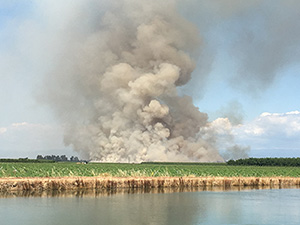 Agricultural Burning has traditionally been important to farmers and forest and wild land managers. Agricultural and residential burning is not prohibited under state law; however, authorities strictly regulate this activity. Responsible compliance with the rules for agricultural and open burning minimizes the impact on public health and preserves the region. All burning requires a valid permit including agricultural.
Agricultural Burning has traditionally been important to farmers and forest and wild land managers. Agricultural and residential burning is not prohibited under state law; however, authorities strictly regulate this activity. Responsible compliance with the rules for agricultural and open burning minimizes the impact on public health and preserves the region. All burning requires a valid permit including agricultural.
Agricultural burning is the open burning of vegetative materials produced from commercial growing and harvesting of crops or raising fowl or animals. Agricultural burning also includes the use of open outdoor fires used in the operation or maintenance of a system for the delivery of water, wild land burning, forest management burning including silviculture and timber operations, and prescribed burning. Agricultural burning helps farmers remove crop residues left in the field after harvesting grains such as hay and rice, and for orchard and vineyard prunings and tree removal. Burning is also helpful in removing weeds, preventing disease and controlling pests. For some crops including rice, burning is the most efficient and effective way to control disease.
Rice Burning Quick Reference Guide
Burn Request Form for Cultivation Spot Burning
Application to Burn One in Four
Related Files
| Attachment | Size |
|---|---|
| BCC Approved Smoke Management Plan (484.38 KB) | 484.38 KB |
| Rice Straw Reduction Act (33.56 KB) | 33.56 KB |
| Rice Burning in Glenn County Presentation (1.82 MB) | 1.82 MB |
